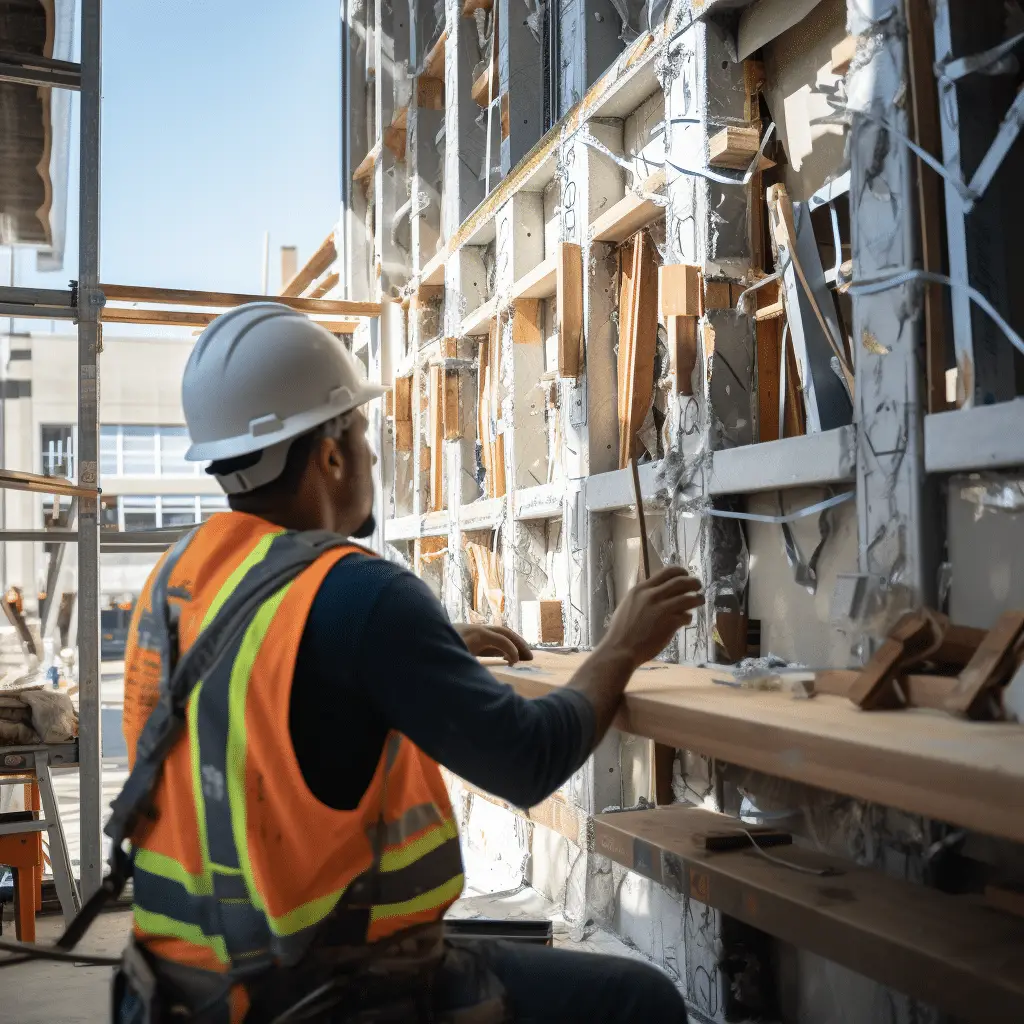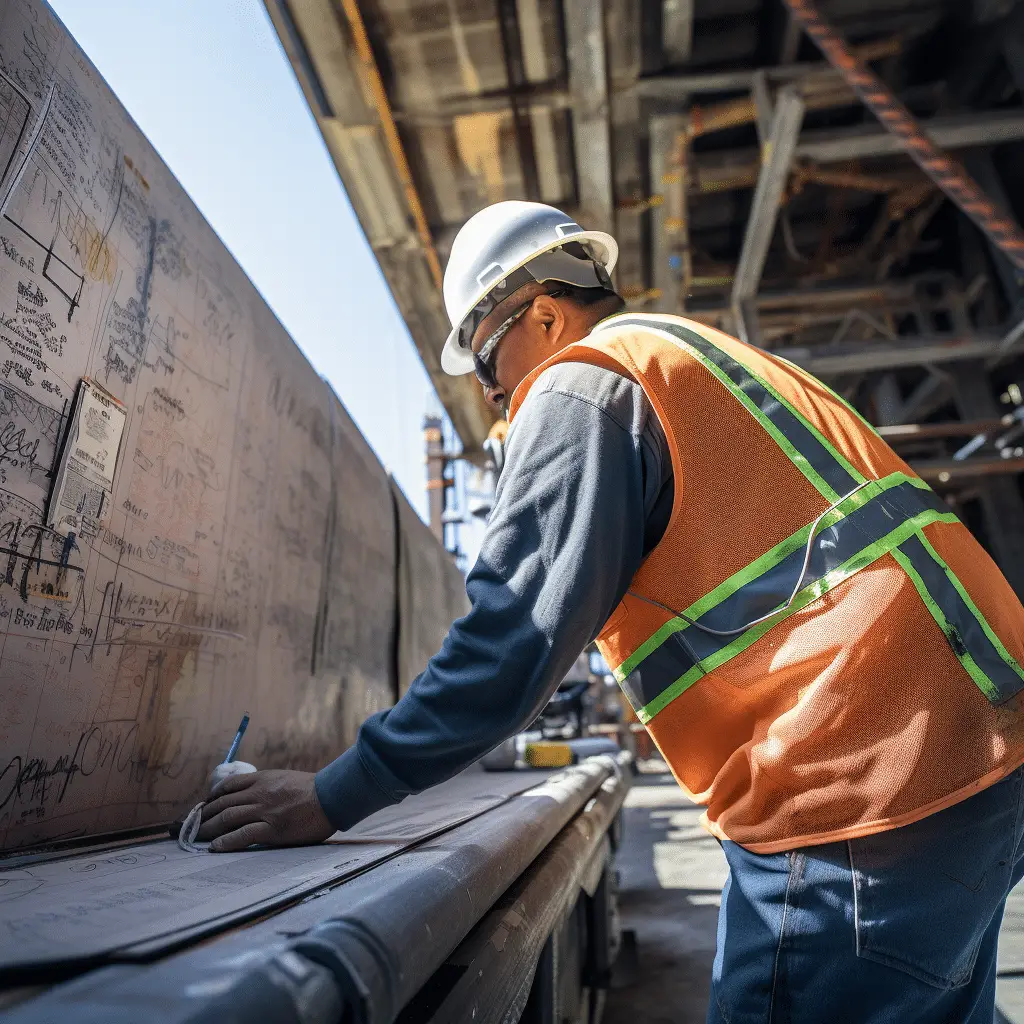Ensuring Construction Safety Through Rigorous Material Testing
Material testing is an indispensable process in the construction industry that plays a crucial role in ensuring project integrity and the production of high-quality structures. Rigorous testing and quality assurance are essential for construction safety and meeting regulatory requirements. By conducting thorough material testing, construction professionals can identify potential risks, make informed engineering decisions, and uphold the highest standards of quality and safety.
Key Takeaways:
- Material testing is crucial for maintaining project integrity and ensuring the safety of construction projects.
- Rigorous testing and quality assurance are essential for producing high-quality structures.
- Material testing helps identify potential risks and make informed engineering decisions.
- Compliance with regulatory organizations is mandatory in the construction industry.
- By incorporating material testing processes, construction professionals can achieve high-quality results and enhance construction safety.
What is CMT?

Construction Materials Testing (CMT) is a critical process in engineering projects that involves the testing of building materials. CMT ensures the quality and performance of these materials, which are essential for constructing durable and safe structures. The CMT process consists of both field testing and laboratory testing to assess the characteristics and properties of various construction materials.
Field testing in CMT is conducted on-site and involves the evaluation of materials such as soils, concrete, asphalt, steel, masonry, and timber. This type of testing provides valuable information about the quality and suitability of the materials for specific construction applications. On the other hand, laboratory testing is performed in controlled environments and allows for more in-depth analysis of material samples. These tests provide detailed insights into factors like soil properties, asphalt characteristics, masonry strength, and concrete properties.
Certification programs offered by organizations like the Department of Transportation (DOT), American Concrete Institute (ACI), and Environmental Protection Agency (EPA) play a crucial role in the CMT field. These programs provide specialized knowledge and credentials to professionals involved in material testing, ensuring their competency in conducting accurate and reliable tests. By combining field testing and laboratory testing, CMT professionals can provide comprehensive assessments of construction materials and contribute to the success of engineering projects.
Field Testing in Material Testing
Field testing is a crucial component of material testing in construction. It involves the on-site evaluation of construction materials through visual inspection and non-destructive techniques. Field testing allows us to assess the quality and performance of various construction materials, including steel structures, retaining walls, and soil foundations.
During field testing, construction professionals conduct visual inspections to identify any visible defects or anomalies in the materials. This hands-on approach provides valuable insights into the condition of the materials and helps determine their suitability for the project. In addition to visual inspections, non-destructive techniques are employed to assess the structural integrity and properties of the materials without causing any damage.
Field testing provides valuable data and information about the construction materials, helping engineers make informed decisions about their use in the project. By identifying any potential issues or inconsistencies early on, field testing helps mitigate risks and ensures the safety and quality of the construction project.
Examples of Field Testing in Material Testing
Field testing encompasses a wide range of construction materials. Here are some examples of field testing for different material types:
- For soils, field testing involves tests such as visual classification, compaction tests, and moisture content measurements.
- For concrete and asphalt, field testing includes assessing consistency, workability, and strength through tests like slump tests and core sampling.
- For steel structures, field testing may involve visual inspections for any cracks, deformations, or other signs of structural damage.
- For retaining walls, field testing includes evaluating the stability and load-bearing capacity through methods like load testing and settlement monitoring.
- For soil foundations, field testing encompasses tests to determine the bearing capacity, permeability, and compaction characteristics of the soil.
| Construction Material | Field Testing Methods |
|---|---|
| Soils | Visual classification, compaction tests, moisture content measurements |
| Concrete and Asphalt | Slump tests, core sampling, consistency and workability assessment |
| Steel Structures | Visual inspections for cracks, deformations, structural damage |
| Retaining Walls | Load testing, settlement monitoring, stability evaluation |
| Soil Foundations | Bearing capacity tests, permeability assessment, compaction characteristics evaluation |
In some cases, field testing may yield inconclusive results or require further analysis. When this happens, samples of the materials can be gathered for laboratory testing. Laboratory testing provides more detailed and precise information about the properties and characteristics of the materials and helps ensure their suitability for the project.
Overall, field testing plays a crucial role in material testing for construction projects. It provides valuable data and insights that enable engineers to make informed decisions about the materials’ suitability, ensuring the safety, quality, and success of the project.
Laboratory Testing in Material Testing
Laboratory testing plays a crucial role in material testing, particularly when further study and analysis are required after field testing. This type of testing is typically conducted on an as-needed basis and focuses on various materials used in construction projects, such as soil, asphalt, masonry, and concrete.
Soil testing in the laboratory involves a range of tests to assess properties like density, strength, permeability, and classification. These tests provide valuable insights into the behavior and suitability of the soil for specific construction applications.
Similarly, asphalt testing in the lab involves evaluating the characteristics and properties of asphalt mixes, including viscosity, temperature susceptibility, and resistance to fatigue and deformation. This ensures that the asphalt used in construction projects meets the necessary performance criteria.
Masonry and concrete testing are also vital components of laboratory testing. These tests assess the strength, durability, and other key properties of masonry units and concrete samples to ensure they meet the required standards. Flexural strength testing, compression strength testing, and absorption testing are common tests conducted in the lab for masonry and concrete materials.
Table: Laboratory Testing in Material Testing
| Material | Testing Parameters |
|---|---|
| Soil | Density, strength, permeability, classification |
| Asphalt | Viscosity, temperature susceptibility, fatigue resistance, deformation resistance |
| Masonry | Flexural strength, compression strength, absorption |
| Concrete | Flexural strength, compression strength, absorption |
Laboratory testing is an essential part of a comprehensive Construction Materials Testing (CMT) regimen. By conducting these tests, engineers and construction professionals can gather valuable data, ensure the quality and performance of materials, and make informed decisions during the construction process.
Why is Material Testing Important in Construction?
In the construction industry, ensuring construction quality, viability, and safety are of utmost importance. Material testing plays a vital role in achieving these objectives by providing valuable insights into the performance and suitability of construction materials. Let’s explore why material testing is crucial in construction.
The Importance of Material Testing
Material testing is a regulatory requirement in most large-scale construction projects. It is necessary for compliance with industry standards and regulations imposed by organizations such as ASTM, FAA, USACE, and AASHTO. By conducting material testing, engineers and builders can assess the quality and integrity of their projects, ensuring they meet specific requirements and avoid costly mistakes.
Making Informed Engineering Decisions
Material testing helps engineers make informed decisions about the selection and use of construction materials. By evaluating the performance and properties of materials through rigorous testing, engineers can identify potential risks and choose materials that meet the project’s safety and quality standards. This ensures that the construction project is built to last and can withstand various environmental conditions.
Ensuring Quality Control
By incorporating material testing into construction projects, builders can maintain high-quality standards throughout the entire construction process. Material testing allows for identification of any defects or deviations in the materials, ensuring that only materials of the highest quality are used. This helps prevent failures and structural issues, enhancing the overall safety and durability of the constructed building or infrastructure.
| Benefits of Material Testing in Construction |
|---|
| Assesses construction quality |
| Ensures project viability and safety |
| Facilitates compliance with regulatory requirements |
| Aids in making informed engineering decisions |
| Enhances quality control during construction |
Types of Construction Material Testing
Construction material testing plays a crucial role in ensuring the quality and performance of materials used in construction projects. Two primary types of testing are conducted: field testing and laboratory testing. Field testing involves on-site evaluation of construction materials, while laboratory testing is performed in controlled environments to provide more in-depth analysis. Both types of testing are essential for assessing the suitability of materials and ensuring compliance with industry standards.
Field Testing
Field testing is conducted on construction sites and involves the visual inspection and non-destructive evaluation of materials. This type of testing allows for the assessment of materials such as soils, concrete, asphalt, steel, masonry, and timber. Field testing helps identify any potential issues or risks associated with the materials and ensures that they meet the required specifications for construction projects.
Laboratory Testing
Laboratory testing is performed on samples of construction materials collected from the project site. This type of testing allows for more detailed analysis of the materials and provides accurate and reliable results. Laboratory testing includes tests for properties such as soil characteristics, asphalt composition, masonry strength, and concrete properties. Through laboratory testing, engineers and construction professionals can determine the quality and performance of construction materials, making informed decisions about their use in the project.
| Type of Material Testing | Testing Method | Materials Assessed |
|---|---|---|
| Field Testing | Visual inspection, non-destructive techniques | Soils, concrete, asphalt, steel, masonry, timber |
| Laboratory Testing | Sample analysis in controlled environment | Soils, asphalt, masonry, concrete |
Both field testing and laboratory testing are crucial for ensuring the quality, safety, and performance of construction materials. By conducting these tests, construction professionals can mitigate risks, avoid costly mistakes, and ensure compliance with industry standards. The data obtained from material testing helps inform engineering decisions, ensures the structural integrity of projects, and contributes to the overall success of construction endeavors.
Regulatory Requirements for Construction Projects
In the construction industry, regulatory requirements play a crucial role in ensuring compliance, safety, and adherence to industry standards. These requirements encompass building material codes and specifications that govern construction projects. Oversight organizations such as ASTM, USACE, FAA, and AASHTO establish and enforce these regulations, which are designed to maintain quality, safety, and regulatory compliance.
Compliance with regulatory requirements is essential to ensure that construction projects meet the necessary standards and specifications. These requirements provide guidelines for the use of appropriate materials, highlight potential risks, and help avoid costly mistakes that could compromise project integrity. By adhering to regulatory standards, construction professionals can safeguard the quality and safety of their projects, mitigating the potential for non-compliance and associated repercussions.
Building material codes and regulations vary from state to state, but these regulations serve as a framework for construction projects across the country. Compliance with industry standards and regulatory requirements ensures that construction materials meet specific criteria for durability, strength, and reliability. Additionally, adherence to these regulations promotes consistency, transparency, and accountability in the construction industry.
Benefits of Compliance with Regulatory Requirements
Complying with regulatory requirements offers several benefits to construction projects. First and foremost, it helps maintain the safety and integrity of structures by ensuring that the materials used meet industry standards. Compliance also reduces the risk of structural failures and associated liabilities, protecting both the construction professionals and the end-users.
Furthermore, compliance with regulatory requirements facilitates smoother project execution by providing clear guidelines and benchmarks for quality control. By adhering to these standards, construction professionals can avoid costly rework, delays, and disputes. Compliance also enhances the reputation of construction companies, fostering trust among clients, stakeholders, and regulatory authorities.
| Benefits of Compliance with Regulatory Requirements: |
|---|
| Ensures safety and integrity of structures |
| Reduces the risk of structural failures and liabilities |
| Facilitates smoother project execution |
| Avoids costly rework, delays, and disputes |
| Enhances the reputation of construction companies |
In summary, regulatory requirements in construction projects are vital for ensuring compliance, safety, and the use of high-quality materials. By following building material codes and adhering to industry standards, construction professionals can mitigate risks, maintain project integrity, and deliver successful outcomes.
Benefits of Material Testing in Construction
Material testing in construction ensures quality control, mitigates risks, reduces costs, improves safety, and meets safety standards. Construction professionals can protect building structures, reduce failures, and reduce liabilities by using rigorous material testing processes.
Construction material testing helps control quality. Professionals can find defects, inconsistencies, and poor quality early in the project by rigorously testing construction materials. This allows for pre-construction adjustments and improvements to ensure the final structure meets quality standards.
Material testing helps mitigate risk by identifying material hazards. Professionals can identify safety and durability issues by evaluating construction materials. This allows them to plan ahead to mitigate these risks and protect building occupants.
Material testing benefits include cost avoidance. Early detection of material issues or defects helps professionals make informed decisions and avoid costly construction mistakes. Early detection and resolution can save time and money by preventing costly rework or repairs.
Table: Benefits of Material Testing in Construction
| Benefits | Description |
|---|---|
| Quality Control | Ensures adherence to desired quality standards by identifying defects or substandard materials. |
| Risk Mitigation | Identifies potential hazards or vulnerabilities in construction materials, enabling proactive measures to enhance safety. |
| Cost Avoidance | Avoids costly mistakes or rework by detecting material issues early in the construction process. |
| Safety Enhancement | Ensures the safety of buildings and occupants by evaluating the performance and characteristics of construction materials. |
| Compliance with Safety Standards | Ensures adherence to industry safety regulations and standards. |
| Structural Integrity | Safeguards the structural integrity of buildings by identifying any weaknesses or vulnerabilities in construction materials. |
Lastly, material testing ensures safety, building code, and regulatory compliance. Professionals can ensure project safety and regulatory compliance by testing construction materials. To protect building occupants, meet legal requirements, and avoid litigation, these standards must be followed.
Finally, material testing in the construction industry improves quality control, risk mitigation, cost avoidance, safety, compliance with safety standards, and structural integrity. Professionals can complete high-quality, safe, and compliant projects by incorporating material testing into the construction process.
Material Testing Professionals
Material testing professionals are essential for construction project quality and safety. These experts perform field and laboratory testing to accurately evaluate construction materials. A certified testing company like Intertek or Laboratory Testing Inc. can ensure your project meets building codes and industry standards.
Field and lab testing are available from material testing professionals to evaluate construction materials. Field testing examines soils, concrete, asphalt, steel, masonry, and timber on-site. However, laboratory testing analyzes and evaluates material samples.
Material testing professionals ensure your construction project meets standards and specifications. These experts can provide accurate test results and certifications, ensuring your materials are high-quality and suitable for your project. Material testing professionals ensure construction quality and safety by following building codes and industry regulations.
Benefits of Working with Material Testing Professionals

Collaborating with material testing professionals offers various benefits for construction projects:
- Expertise: Material testing professionals have the knowledge and expertise to accurately evaluate construction materials, ensuring their quality and performance.
- Compliance: By working with certified testing companies, you can ensure that your project complies with building codes and industry standards.
- Quality Assurance: Material testing professionals help enhance the quality assurance process, identifying potential risks and preventing costly mistakes during construction.
- Safety: By conducting thorough material testing, professionals can help enhance the safety of your construction project, reducing the risk of failures or accidents caused by substandard materials.
| Benefits of Working with Material Testing Professionals |
|---|
| Expertise |
| Compliance |
| Quality Assurance |
| Safety |
Conclusion
Material testing is essential to building. It’s vital for project integrity, quality, and safety. Construction experts can assess material performance and quality by undertaking thorough field and laboratory testing.
High-quality results require regulatory compliance and certified material testing personnel. Material testing helps discover dangers, eliminate costly mistakes, and improve structural safety and lifetime. It ensures building projects satisfy safety and industry requirements.
Material testing gives building professionals piece of mind that their products are high-quality and meet criteria. Risk mitigation, cost avoidance, and quality control benefit. With thorough material testing, construction projects may be completed safely and effectively.
Material testing is essential in household building, commercial projects, and large-scale engineering. It gives confidence in building material quality and safety, resulting in successful and sustainable projects.
FAQ
What is material testing in construction?
Material testing, also known as Construction Materials Testing (CMT), is the process of testing building materials used in construction projects to evaluate their performance and quality.
Why is material testing important in construction?
Material testing is crucial for maintaining project integrity, ensuring the safety and quality of construction projects, and making informed engineering decisions.
What does field testing in material testing involve?
Field testing in material testing involves on-site evaluation of construction materials through visual inspection and non-destructive techniques.
What is laboratory testing in material testing?
Laboratory testing in material testing is performed on material samples taken from the project site and includes further analysis of soil, asphalt, masonry, and concrete.
How does material testing help in construction?
Material testing helps classify building sites, identify potential risks, ensure compliance with regulatory requirements, and maintain construction quality.
What are the types of construction material testing?
Construction material testing includes field testing, which evaluates materials on-site, and laboratory testing, which involves further analysis of material samples.
What are the regulatory requirements for construction projects?
Regulatory requirements for construction projects vary, but organizations like ASTM, FAA, USACE, and AASHTO impose compliance requirements and standards.
What are the benefits of material testing in construction?
Material testing provides quality control, risk mitigation, cost avoidance, safety enhancement, and helps ensure compliance with safety standards.
Why should I work with material testing professionals?
Working with certified testing professionals ensures compliance with building codes and industry standards, as well as accurate test results and certifications.
How does material testing contribute to construction quality?
Material testing is essential for assessing construction quality, ensuring project viability and safety, and avoiding costly mistakes or damage caused by substandard materials.








